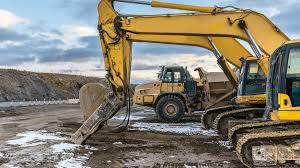Key Takeaways:
- Understand the importance of regular maintenance for heavy equipment
- Explore best practices for operator training and safety
- Learn about modern technology solutions for equipment management
- Discover ways to optimize operational costs
Effective management of heavy construction equipment involves several vital strategies. Regular maintenance schedules ensure machinery operates efficiently and minimizes downtime. Proper training for operators promotes safety and optimizes performance. Implementing GPS tracking enhances equipment utilization and theft prevention. Utilizing advanced telematics provides real-time data on equipment health and usage patterns. Developing a robust inventory management system helps track equipment location, availability, and maintenance history. Last but not least, encouraging a culture of safety and responsibility among employees guarantees adherence to rules and improves the general effectiveness and success of the project.
The Importance of Regular Maintenance
Regular maintenance is essential for ensuring the longevity and efficiency of heavy construction equipment. Routine checks help identify potential issues early, preventing costly breakdowns. This covers everything from routine filter and oil changes to more thorough examinations of electrical and hydraulic systems. For instance, consistently monitoring fluid levels can avert hydraulic system failures, saving time and money. Neglecting regular maintenance can result in severe issues that lead to expensive repairs and significant downtime. When looking for reliable machinery, checking excavators for sale at trusted sources ensures you invest in quality equipment with a thorough maintenance history.
Best Practices for Operator Training and Safety
Operator training is a critical component of construction site safety and equipment efficiency. Well-trained operators understand their machines’ intricacies, reducing the likelihood of mishandling and accidents. A safer workplace is achieved by investing in thorough training programs, which improve operator skills and lower the possibility of accidents. According to the Occupational Safety and Health Administration, adequate training is one of the most significant ways to lessen workplace hazards. This can include hands-on training sessions, safety drills, and ongoing education about new equipment and techniques. Furthermore, training programs can also foster a safety culture, making it a priority for all employees on the construction site.
Investing in Modern Technology Solutions
Incorporating modern technology into your equipment management practices can provide substantial benefits. Telematics systems, for instance, offer real-time data on equipment usage, health, and performance, enabling better decision-making and proactive maintenance. With telematics, managers can track machinery remotely, monitor fuel consumption, and even predict mechanical failures before they occur, thus preventing unexpected downtime. Using such systems can dramatically improve efficiency and reduce downtime. Other technologies, like GPS tracking and automation, can enhance operational efficiency by optimizing routes and reducing idle times. As the industry advances, staying updated with the latest technological solutions becomes imperative for competitive and efficient construction operations.
Optimizing Operational Costs
Managing operational costs is a crucial concern for many construction companies. Fuel consumption is one area where significant savings can be achieved. Employing fuel-efficient machinery and regularly monitoring fuel use can lead to noticeable cost reductions. Operators can be trained on fuel-efficient driving practices to make the most out of every gallon. A proper logistics plan can also minimize idle times and unnecessary fuel consumption. En route optimization and scheduled maintenance prolong equipment life and enhance job site productivity. Furthermore, leveraging technology to monitor and analyze fuel consumption patterns can help identify inefficiencies and make data-driven decisions for cost optimization.
Proactive Equipment Replacement
While maintenance and technology can extend the life of your equipment, there comes a time when replacement is necessary. Proactively replacing outdated machinery can prevent unexpected breakdowns that disrupt project timelines. Operating aging or obsolete equipment can often lead to increased repair costs and extended downtimes, which are detrimental to high-stakes construction. Considering the total cost of ownership, including downtime, is essential when deciding to replace equipment. New machinery purchases may come with a higher initial cost but may also lead to cheaper ongoing costs, more production, and improved site safety.
Building a Preventive Maintenance Schedule
Creating a preventive maintenance schedule tailored to your specific equipment can help ensure all machinery operates at peak performance. Tools like computerized maintenance management systems (CMMS) can assist in planning, scheduling, and tracking maintenance activities efficiently. CMMS offers features such as automated reminders for upcoming maintenance tasks, inventory management for spare parts, and detailed reports on maintenance history. According to ConstructConnect, a well-executed preventive maintenance plan can extend equipment life by up to 20%. This proactive approach minimizes unexpected breakdowns and enhances your construction fleet’s reliability and safety.
Utilizing Data for Decision-Making
Data analytics is becoming increasingly crucial to the control of construction equipment. Project managers can gain insights into equipment performance metrics, utilization rates, and maintenance needs by analyzing data collected from various sources. Patterns and trends that might only be apparent after using this data. Data-driven decisions can help maximize productivity, optimize maintenance schedules, and minimize costs. Furthermore, leveraging predictive analytics can enable managers to anticipate issues before they arise, allowing for timely intervention and reducing unplanned downtime. As construction projects become more complex, making informed, data-backed decisions becomes a significant competitive advantage.
Partnering with Reliable Suppliers
Finally, establishing relationships with reliable suppliers is crucial for maintaining a steady flow of necessary parts and services. Partnering with vetted suppliers ensures access to quality components and skilled technicians when needed. This minimizes downtime, enhances productivity, and ensures your equipment is always in excellent working condition. Reputable vendors may provide invaluable knowledge and assistance, guiding you through obstacles and enabling you to make wise choices. Long-term alliances with reliable suppliers may result in preferential treatment, lower costs, and access to the newest goods and innovations.
Stay in touch to get more news & updates on Vents Breaking.Com!

